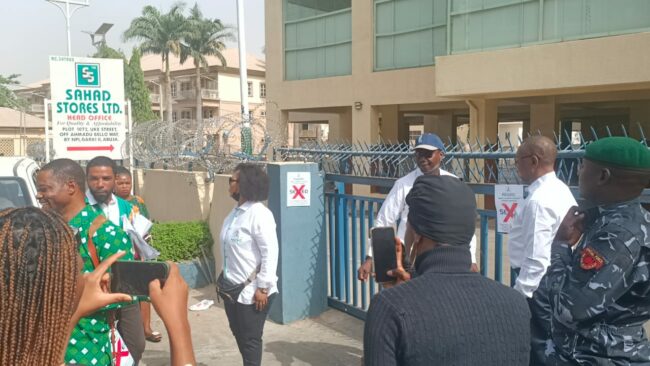The Federal Competition and Consumer Protection Commission (FCCP) sealed up Sahad stores on Friday for shortcoming Customers.
Upon investigation at the stores in Area 11, Abuja, the FCCPC discovered disparities in prices on the shelves and computer systems, which contradict Section 115 of the law.
The Acting Executive Vice Chair, FCCPC, Adamu Abdullahi, during the investigation, said, “What they are doing is misleading pricing and a lack of transparency. Which is against Section 115:3 of the law?
“It’s an obnoxious practice, and Section 115 states that any person who contravenes this is liable to a fine of 100 million naira or even more, and the directors of the company themselves are liable upon conviction, and they are to pay 10 million naira each or imprisonment for six months or both,” he explained.
Abdullahi stated that Sahad stores’ management was called by FCCPC to explain the price disparities in the stores, but they failed to attend.
The summoned individuals included those from the information technology department and those responsible for pricing both on shelves and in the system.
Instead of appearing themselves, they sent their lawyers, who were found to be unfamiliar with their offences upon investigation.
While reiterating his commitment to protect consumer interests, Abdullahi warned that this should serve as a deterrent to cooperation between bodies and businesses that are involved in short-changing customers.
“Things are hard and money doesn’t come by easily; the law must be observed to ensure that the rights of consumers are not violated and that they are not exploited,” he said.
Boladale Adeyinka, Director of Surveillance and Investigation, told newsmen that inspections carried out in the stores show that product brands vary, each with its own price, and pricing is left at the discretion of the cashier, which leads to a lack of transparency.
“Despite all being labelled as “Kwilikwili,” there’s no clear indication of the price for each product. Consequently, the cashier can arbitrarily sell a product worth N700 for N1000, solely deciding the pricing.
“Each branded item should have its own distinct price, and when sold in bulk, they should either be individually priced or grouped with identical items and assigned a uniform price.
“We’ve also noticed identical products from the same brand with different prices. For instance, we encountered underwear priced at N5,000 and N6,000, respectively. If you’re purchasing 10, you’d lose N10,000, which is unfair to consumers,” she explained.
She said prices should be transparently displayed, allowing consumers to make informed decisions based on brand and pricing rather than relying on the cashier’s discretion.
Also, READ THESE TOP STORIES FROM NIGERIAN TRIBUNE
